#Learning organization
Explore tagged Tumblr posts
Text
学習する組織入門
学習する組織は「PDCAサイクルをなぜ回すことがそれほど難しいのか?」を体系的にまとめ上げた組織学習論です。あなたは「PDCAサイクルを回すなんてあたりまえじゃないか!」と思われるかもしれませんが、PDCAサイクルを回ることは実は困難を極めることなのです。なぜなら、みんながPDCAサイクルを回せるのであれば、みんながやり抜く力を発揮している超一流の人間になっているからです。では、そもそもなぜPDCAサイクルを回すことはそれほど難しいのでしょうか?この点について学習する組織の提唱者であるピーター・M・センゲは(以下敬愛の念を込めてセンゲ先生と記します)は人々からやる気が喪失しているからだと述��ています。このやる気スイッチのオフ状態について従来やる気がないのは自己責任であるとされてきました。その最たるものがやり抜く力の提唱者であるアンジェラ・ダックワースです。しかし、センゲ先生はやる気スイッチがオフ状態なのは組織の構造的欠陥にあると述べています。この構造的欠陥には系統的なパターンがあり、そのパターンのことをシステムの原型と呼んでいます。いわゆる、システム思考です。僕はこのシステム思考を知って、とても感動し、職場で使ってみようと思うようになりました。しかし、職場での反応は冷ややかなモノでした。この点について大変悲しく思いました。僕は理論的に正しいことを訴えているはずでした。なのに、周りの反応は芳しくありませんでした。このことについて、悩みました。そして、悩んで末にある結論に至りました。それは人が率先して”見ざる聞かざる言わざる”となり、そうすることでやる気スイッチのオフ状態になること(没個性的になること)と引き換えに自分を守っているということです。思い返してみてください。就活生の頃、あなたは青臭く、そして、泥臭かったはずです。しかし、社会人となって、社会人としての”まともさ”を身につけるに従い、やる気スイッチがオフ状態となったはずです。この先程申し上げた”まともさ”という言葉がキーワードなのです。そもそも社会人としての”まともさ”とは何を指すのでしょうか?それはまともな身だしなみ、まともなビジネスマナー、まともな従順さ、まともな共感力、まともな協調性、まともな理解力、まともな事務処理能力、まともなストレス耐性、まともな体力、まともな気力等です。これらが”まともさ”を構成しており、これらは人が本来持っているやる気スイッチを抑圧的に蝕みます。この抑圧的にという表現はフロイトが生み出した精神分析学の抑圧を意味します。つまり、社会人として生きていくに従い、気づかぬうちにやる気が喪失しているのです。また、この点について、あなたの無意識は自ら進んでやる気スイッチのオフと引き換えに”まともさ”を身につけることを選択しているのです。なぜでしょうか?それはみんながやる気スイッチのオフ(没個性的なること)と引き換えに”まともさ”を身につけることを選択しているからです。この同調圧力は極めて強固なものであり、あなたがこの同調圧力に抗してやる気スイッチをオンにしようとすれば、”KY”であるとみなされ、窓際族と化すでしょう。このことをあなたは無意識に理解しているため、自分自身を守るために”まともな道”を進んで選択しているのです。つまり、文字通り”出る杭は打たれる”のです。これに対して。天才は文字通り”出過ぎた杭は打たれない”をモットーとしています。近年の研究結果から人は誰もがやり抜く力を秘めている可能性があることが指摘されていますが、あなたがやり抜く力を持った一流を目指すのであれば、このようないばらの道が待ち受けていることを覚悟した方がいいでしょう。
最近になって日本は諸外国から”安い国”であるといわれています。その原因は学習する組織で述べられているように創造性と��産性の欠如にあるのではないかと思います。この点に関して僕なりの考えがあります。それは「なぜ多くの人がやる気スイッチがオフとなってしまうのか?」を理性的にではなく、感情的に共感し、周囲の人が”本当は”「どう活躍し、また、どのように生きたいのか?」を察する”やさしさ”です。この”やさしさ”をセンゲ先生は”愛”と表現しています。すなわち、本当は”知”とは経済的成功と権力掌握のための”力”ではなく、みんなの苦しみを察するためのマザー・テレサが持ち合わせていたような”愛”なのです。あなたがシステム思考を理解したうえで、押し付けの善意ではない相手が本当に求めている”ヘルプ・ミー”の声を汲むことは少なからず試行錯誤が必要です。しかしながら、その格闘の中であなたがあなたらしく生き、そして、あなたの周囲の人がその人らしく生きることが可能となるはずです。これを急ぎすぎてはなりません。なぜなら、システムを改善するにはゆっくりと確実に解決することが求められるのですから・・・。
#学習する組織#経営学#mba#mba courses#mbacollege#peter senge#learning organization#mit#ビジネス#自己啓発本#自己啓発#自己肯定感#自己分析#自己実現
4 notes
·
View notes
Text
seething about the fact that i will never experience photosynthesis in my own useless cells. i bet it feels so good when the light of the sun both warms you and fuels you at the same time. a bone-deep satisfaction mixed with a heated sugar-rush and endless brightness. not that i would fucking know
41K notes
·
View notes
Text
Engaging Learners: The Power of Double-Loop Learning

Making learners active participants in their own learning is every training professional’s dream. A passive recipient of knowledge often fails to apply what they’ve learned effectively, whereas an engaged, inquisitive workforce continuously thinks, questions, and innovates. Achieving this level of engagement requires more than just effective teaching techniques; it involves a fundamental shift in how learning is approached. This is where Chris Argyris and Donald Schön’s theory of ‘double-loop’ learning becomes invaluable.
In this article, we’ll explore the concepts of ‘single-loop’ and ‘double-loop’ learning, highlight the differences between them, and demonstrate how ‘double-loop’ learning can transform a company into a vibrant learning organization.
Understanding Single-Loop and Double-Loop Learning
To grasp the significance of double-loop learning, it’s essential first to understand single-loop learning.
Single-Loop Learning refers to the process where individuals, groups, or organizations modify their actions based on feedback received, without altering the underlying beliefs or policies. This type of learning is akin to a thermostat that changes temperature settings in response to the environment but doesn’t question why it’s set to a particular range. For example, an employee might follow a certain protocol more closely after receiving feedback that they were not compliant, but they don’t question whether the protocol itself could be improved.
Double-Loop Learning, on the other hand, goes deeper. It involves questioning and potentially altering the underlying assumptions, values, and policies that led to the actions in the first place. It’s about understanding the ‘why’ behind the ‘what’. Instead of merely adjusting actions to meet a desired outcome, double-loop learning challenges the governing variables and redefines the problem itself. In our thermostat analogy, this would mean not just changing the temperature setting, but questioning whether the temperature range is appropriate at all.
The Distinction Between Single-Loop and Double-Loop Learning
The primary difference between single-loop and double-loop learning lies in their scope and depth of inquiry.
Nature of Inquiry:
Single-Loop Learning: Reactive and corrective, focusing on immediate issues and making incremental changes.
Double-Loop Learning: Proactive and reflective, addressing the root causes and potentially redefining the problem.
Focus:
Single-Loop Learning: Concentrates on tasks, skills, and immediate performance improvements.
Double-Loop Learning: Emphasizes broader organizational values, strategies, and fundamental principles.
Outcome:
Single-Loop Learning: Maintains the status quo by fine-tuning existing processes.
Double-Loop Learning: Facilitates transformational change by re-evaluating and potentially overhauling processes.
Building a Vibrant Learning Organization with Double-Loop Learning
Creating an environment where double-loop learning flourishes involves fostering a culture of continuous reflection and open dialogue. Here’s how organizations can achieve this:
Encourage Critical Thinking and Inquiry:Promote a culture where employees are encouraged to ask ‘why’ and challenge existing assumptions. This can be achieved through training programs that focus on critical thinking skills and creating safe spaces for questioning.
Facilitate Open Communication:Establish channels for open communication where feedback flows freely in all directions. Leaders should model transparency and receptivity to feedback, showing that questioning is valued over mere compliance.
Promote Reflective Practice:Implement practices that encourage reflection on both successes and failures. Regular debriefings, post-mortem analyses of projects, and reflective journaling can help employees internalize double-loop learning.
Supportive Leadership:Leaders play a crucial role in fostering double-loop learning. They must be willing to question their own assumptions and support their teams in doing the same. Leadership development programs can help inculcate these values.
Systems Thinking:Encourage systems thinking, which involves understanding how different parts of the organization interact and influence each other. This holistic approach can help in identifying the underlying causes of issues and in developing comprehensive solutions.
Incorporate Learning into Daily Work:Integrate learning into the daily workflow rather than treating it as a separate activity. This can involve setting aside time for reflection during meetings, encouraging ongoing education, and recognizing learning as a part of job performance.
Case Study: Implementing Double-Loop Learning
Consider a mid-sized tech company facing declining customer satisfaction. Through single-loop learning, the company’s response was to improve customer service training and reduce response times. However, these efforts didn’t lead to significant improvement.
Adopting a double-loop learning approach, the company decided to re-examine their assumptions about customer satisfaction. They discovered that the core issue was not the service itself but unmet customer expectations due to a mismatch between marketing promises and product features. By addressing this fundamental issue, redefining their marketing strategies, and aligning them with product capabilities, they not only improved customer satisfaction but also enhanced overall brand trust.
The Impact of Double-Loop Learning on Organizational Performance
The benefits of double-loop learning extend beyond individual or team performance, influencing the entire organization’s adaptive capacity and resilience.
Enhanced Innovation: By constantly questioning and redefining problems, organizations can uncover innovative solutions that single-loop learning might overlook. This leads to a more dynamic and creative work environment.
Greater Agility:Organizations practicing double-loop learning are better equipped to adapt to changing environments. They are not bound by rigid procedures but are flexible in revising strategies based on reflective insights.
Improved Decision Making:Decision-making processes become more robust as they incorporate deeper insights and a broader range of perspectives. This holistic view reduces the risk of oversights and enhances strategic planning.
Employee Empowerment:When employees are encouraged to think critically and challenge assumptions, they feel more valued and empowered. This leads to higher engagement, job satisfaction, and retention.
Organizational Learning Culture:A culture of double-loop learning fosters ongoing learning and development. It promotes an environment where continuous improvement is the norm, and learning is embedded in the organizational DNA.
Conclusion
Double-loop learning offers a powerful framework for transforming how organizations approach learning and problem-solving. By moving beyond surface-level corrections and delving into the underlying assumptions and values, organizations can foster a culture of deep learning and continuous improvement. This shift not only enhances individual and team performance but also drives organizational innovation, agility, and resilience.
As training professionals and organizational leaders, the challenge is to create environments that support and nurture double-loop learning. This involves encouraging critical thinking, promoting open communication, and integrating reflective practices into daily workflows. By doing so, organizations can achieve the dream of having an engaged, inquisitive, and proactive workforce—one that is not just a passive recipient of knowledge but an active participant in its own learning journey.
#Active learning#Employee engagement#Training professionals#Double-loop learning#Single-loop learning#Chris Argyris#Donald Schön#Learning organization#Critical thinking#Inquiry-based learning#Reflective practice#Open communication#Leadership development#Systems thinking#Organizational culture#Transformational change#Continuous improvement#Adaptive capacity#Organizational resilience#Innovation in training#Holistic approach#Decision making#Employee empowerment#Learning strategies#Performance enhancement#Problem-solving#Knowledge retention#Learning feedback#Reflective insights#Training methodology
0 notes
Text
Of the 19 hijackers who carried out the Sept 11 attacks:
15 were from Saudi Arabia (a powerful/oil-rich country the U.S. works hard to maintain diplomatic relations with)
2 were from the United Arab Emirates (also a powerful/oil-rich country the U.S. works hard to maintain diplomatic relations with)
1 was from Egypt, 1 from Lebanon.
None of the hijackers were from Iraq.
None of the Sept 11 hijackers were Iraqi.
None of the 9/11 hijackers were from Iraq.
#9/11#serious post#not a shitpost#this should be one of the first things kids learn when they learn about the 9/11 attacks#politics#this is just...it's such an essential and brazen fact and i rarely see basic outrage over it#i want outrage. i want fury. i want disgust over the way fundamental facts are disguised and discarded and downplayed#because there are things we should KNOW. basic fact we should ALL KNOW. and they are tucked away in the footnotes.#and no this is NOT to put the blame on other middle eastern countries#we know this was carried out by a specific terrorist organization not a national government#but King George the Second decided (and was encouraged by his cabinet!) to invade a nation!#a nation that was not at all related or responsible!!!#a dictatorship to be sure--but a dictatorship that King George the First had been happy to support#so what changed? why did we go in guns blazing to DEMOLISH a country *we had NO PLANS OF REPAIRING*???#well. because they wanted a villain didn't they. a nice clean war. clarity of purpose. us the heroes against them the villains#and when you're in that mindframe--truth is irrelevant. you can pick your villain (your victim) by rolling a roulette wheel#truth is irrelevant#worse: to the people in charge#truth is a HINDRANCE#'Alternative facts' existed long before it became a catchphrase#facts don't matter. truth doesn't matter. the impulses of a handful of volatile & rich & power-high people--that's History. congratulations
33K notes
·
View notes
Text

2011-2017: NTN Americas Town Hall Meeting & Leadership Academy
2015-2017: NTN Americas Town Hall Meetings at 12 companies in 15 locations
2015 Town Hall Meetings in NTN Americas -"NTN Corporate Strategy & Vision"
2016 Town Hall Meetings in NTN Americas -"NTN Corporate Philosophy"
2017 Town Hall Meetings in NTN Americas - "Maximizing the Value of NTN Americas"
2011 - 2016: NTN Americas "Leadership Academy" - Building a "Learning Organization" by "Middle up/down Management"
#tetsuya sogo#十河哲也#CEO#NTN Americas#NTN Corporation#Town Hall Meeting#Leadership Academy#learning organization#middle up/down management
0 notes
Text
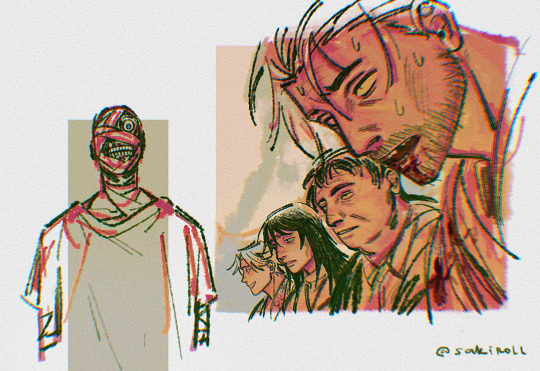
mouthwash for rotten teeth
#mouthwashing#wrong organ#my art#god i love this game i've been obsessed i have so many thoughts every day i realize and learn something new
2K notes
·
View notes
Text
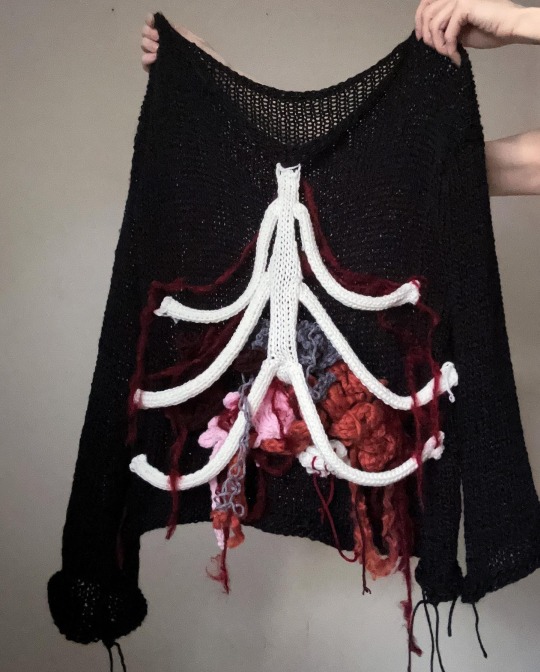

Gutted Sweater by CarolineMoorenc
#So sorry about the confusion with the tags. This IS crochet!! NOT KNIT#This was the first post of Y2Knot's art I made and at the time I was unsure which it was#since then I've learned she mostly does crochet.#I just forgot to chabge the tags on This post.#textiles#crochet#art#fashion#bones#organs#y2knots#CarolineMoorenc#crocheting#curators on tumblr#curators#fiber art#fiber crafts#gore#guts
13K notes
·
View notes
Text

A full moon shines, an omen of safe travels.
#art#fantasy art#dragon#dragons#caspar david friedrich#friedrich#This one's a study of: Two Men Contemplating The Moon#man i love drawing fantasy ruins but i needed a break for at least one illustration lol#so fun to study the shapes in the environment#i've been learning a lot about flow and composition#even in super organic landscapes#fantasy creatures#travelers#dragon art#fantasy illustration
5K notes
·
View notes
Text

i hc that EDI eventually just disables the camera in the main battery. for everyone’s sake
#she’s certainly learning about organics#mass effect#shakarian#femshep x garrus#garrus x femshep#garrus x shepard#shepard x garrus#how many different ways can i tag this ship lmao#garrus vakarian
960 notes
·
View notes
Text

god i love skk sm i wish gay ppl were real :(
#LOTUS DRAWING ACTUAL POSES AND NOT JUST BUSTS??? WOAH#i swear i actually know anatomy and stuff i just never draw it bc it's too much effort#going to bed <<<<< staying up until two thirty to draw your otp#ALSO.. for those of you who know i'm rewatching bsd w my friend whose never seen it before.. we finally got to ep9#and she IMMEDIATELY clocked in on skk's toxic exes energy😭😭#also she calls chuuya childe bc hes a ginger and his first reaction to seeing dazai was “fight me >:)”#she was like “omgg..hes part of the evil organization🤭 and has beef w the protag (he wants to fuck them😏) *giggles* wait. TARTAGLIA😨😨‼️”#I WAS TRYING SO HARD NOT TO SCREAM.. I COULDNT LET HER KNOW HOW DISTRAUGHT I WAS HEARING THAT FOR THE TENTH TIME#anyway we finished s1 and chuuya's her fav character so far let's see if she can learn his actual name and stop calling him childe😭😭#bungou stray dogs#bungo stray dogs#bsd#dazai osamu#osamu dazai#chuuya nakahara#nakahara chuuya#soukoku#skk#lotus draws
4K notes
·
View notes
Text

it's norf! nort. norgh..
#dbh#i'm reallyreally happy ppl liked the version i made with luther#still figuring out this colouring style so the love it received last time was very encouraging !!#tysm for the feedback im am living and learning.. arms spread out as i spin around and round in a stupid little circle#i got one in the works for multiple characters. like an 8-in-1 deal. i'll post that in ? 2 weeks? maybe less ??#idfk man i got so much buffoonery in the making 💀💀 i love wreaking havoc every week#anyway. part 110956 of me having an embarrassing crush on dbh characters#detroit become human#dbh fanart#dbh north#art#100% organic younger money
180 notes
·
View notes
Text
学習する組織
人は自尊心、内発的なモチベーション、尊厳、学びたいという好奇心、学ぶことの喜びを生まれながらにして備えているのにもかかわらずそれらを従来のマネジメントの一般体系は破壊してきた。(従来のマネジメントの一般体系の詳細は添付した下記の図を参照してほしい)
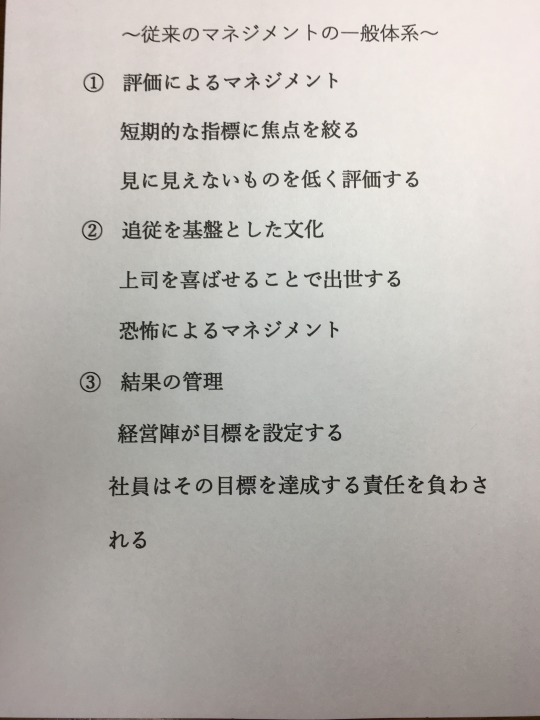
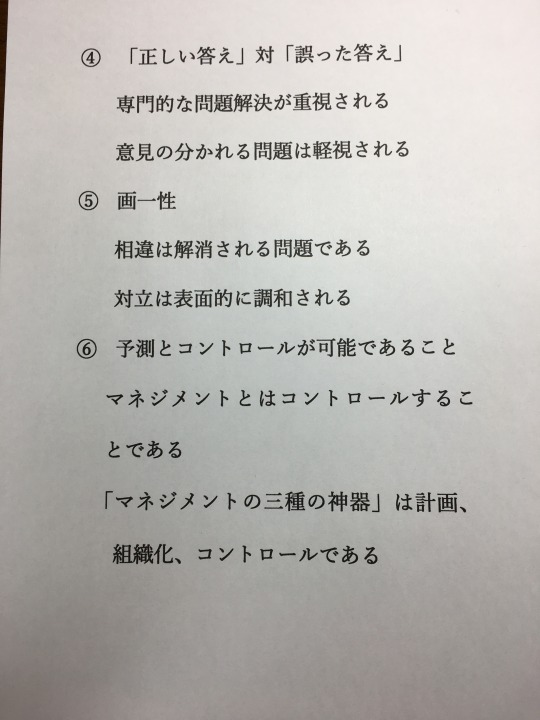
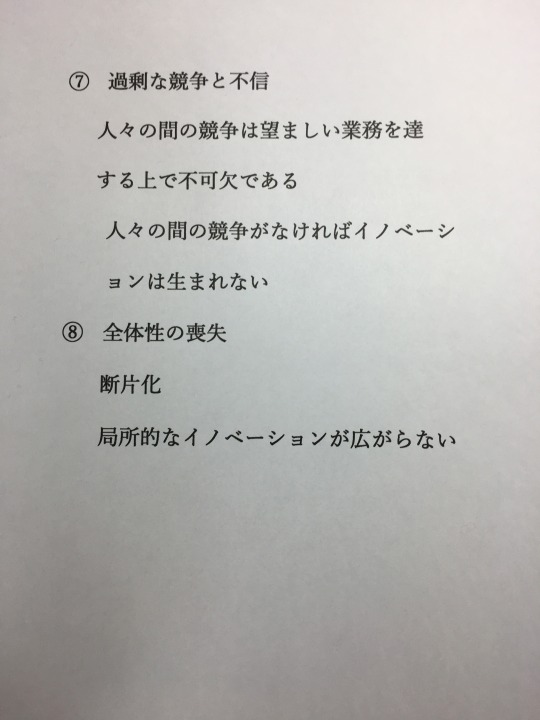
このような伝統的なマネジメントの機能不全によって多くの組織が絶えず目先の緊急事態への対応に追われイノベーションに費やす時間とエネルギーはないに等しい状況にある。この狂乱とカオスは理念中心のマネジメント文化の醸成を阻害し、機に乗じて個人的な権利や富を鷲づかみにする傾向をもたらす。このような他責思考や縦割り意識、当事者意識の欠如などの学習障害は程度の差こそあれほとんどの組織に見受けられる。だからこそ今ほどに「学習する組織」が強く求められる時代はないだろう。「学習する組織」とは目的を達成する能力を効果的に伸ばし続ける組織であり、その目的は皆が望む未来の創造である。「学習する組織」には唯一完全の姿があるわけではない。むしろ変化の激しい環境下で様々な衝撃に耐え復元するしなやかさを持つとともに環境・変化に適応し、学習し、自らをデザインして進化し続ける組織のことである。そして「学���する組織」によって仕事を「手段」とみる見方―仕事は目的を達成する手段であるという見方―から仕事をより「神聖なもの」とする見方―人々は仕事に内在する本質的な恩恵を追い求める見方―へと徐々に変化するだろう。ではどのように「学習する組織」を導入すればいいのだろうか?著者は「チームの中核的な学習能力の三本柱」を提案している。その内訳は「内省的な対話の展開」、「志の育成」、「複雑性の理解」である。そしてこの三本柱をバランスよく伸ばす必要があるということだ。なぜならばただ対話するだけでは皆が望む結果を出せる組織は創造できないからである。またどんな未来を創造したいかについての具体的なビジョンを共有し、一人一人がそのビジョンを自分事として創造的に取り組まなければ前進できないのである。そして仮に共有ビジョンを描けたとしても物理的な制約や利害関係のもつれなど複雑な現実の構造を適切に見極めることができなければ容易に「システムの罠」に陥り現実を効果的に変えることは出来ないだろう。さらに上記の三本柱は5つのディシプリン(理論と手法という意味)に区分される。システム思考。メンタルモデル。自己マスタリー。共有ビジョン。チーム学習である。
まずはシステム思考から論じたい。歴史上初めて人類は誰もとても吸収できないほどの情報を生み出し、誰もとても対応できないほどの相互依存性を生じさせ、誰もついていけないほどの速さで加速する能力を持っている。このような現代社会の中で多くの人が感じる無力感に対する解毒剤がシステム思考である。システム思考とは複雑な状況の根底にある「構造」を見るためのそして「てこの原理」が働きやすい場所を見分けるためのディシプリンである。つまり、システム思考によって私たちは健全性を育む方法―すなわち人々を「無力な人間」になることから現実を形作る「積極的な参加者」となることへ、そして現実に対処することから未来を創り出すことへの認識の変容方法―を学ぶのである。このシステム思考には三つの文法規則が存在するが、その前に三つの文法の根底にある考えを二つ述べたい。このシステム思考を通してみる時の重要なスキルは後述する��ープ図が語る物語―その構造がどのようにしてある特定の挙動パターンを生み出すのか、そしてそのパターンがどのように影響を受ける可能性があるかーを理解することである。もう一つは構造(システム)が挙動(現象)を引き起こし、私の意図と行動によって構造が作用し始めるという考えである。つまり複雑な状況で私たちが無力であることの根源には個々の行為だけを見て、その行為の根底にある構造を見逃しているという考えである。さてシステム思考の三つの文法について説明していきたい。まずは自己強化型のフィードバックループである。このシステムの中にいる場合、いかに小さな変化が良くも悪くも大きな結果になり得るかが全く見えないかもしれない。しかしこのシステムの利用の仕方次第で正のスパイラルにも負のスパイラルにもなり得るのである。次にバランス型フィードバックループについて説明したい。もしあなたがバランス型のシステムの中にいるとしたら、それは安定を求めるシステムの中にいるということである。そのシステムの目指すものが自分にとって良いものならばよい状態が維持されやすくなるため幸せな結果になるだろう。そうでない場合物事を変えようとするあなたの努力はどれもうまく進まないだろう。このバランス型ループの特徴は自分では気づきにくい何らかの目標または目的を維持しようとする自己補正能力があるということだ。この特徴によって、すべての関係者が変化を望んでいる時でさえ現状を維持したり、「何も起こっていない」ように見えるため自己強化型ループより気づきにくいといった問題が生じるのである。このようなバランス型フィードバックループに対する解決策は以下の通りである。「変化に対する抵抗」があるときはいつでも一つ以上の隠れたバランス型プロセスが存在する。この変化への抵抗は気まぐれでも不可解でもないのである。それは必ずと言ってもいいほど従来の規範ややり方への脅威から生じるのである。多くの場合こういった規範は確立された関係の網目の中に組み込まれている傾向がある。権力や支配の分布は固定化されているため規範も固定化されているのである。術策にとんだリーダーならば変化に対する抵抗に打ち克とうとさらに押すのではなく抵抗の源を見つけようとする。暗黙の規範やその規範が組み込まれている関係に焦点を当てるのである。こうしてバランス型ループの「てこの原理」が働く源を見つけて解決に導くのである。最後のシステム思考に関する文法は遅れー行動と結果の間にあるずれーである。行動に対してのアウトプットとしての結果がでるのにタイムラグがあるために目標が行き過ぎて失敗することもあるし、逆に遅れを認識してうまく連動すればプラスの効果が得られるということがこのルールの特徴である。つまりこのルールから以下のような教訓が得られるだろう。闇雲で積極的な行動は往々して意図されていることのちょうど反対の結果を生み出すのである。そのような行動は目標により早くあなたを近づけるのではなく行き過ぎによる状況の不安定性を生じさせるのである。
次にメンタルモデルについて。新しい見識を実行に移すことができないのはその見識が世の中とはこういうものだという心に染みついたイメージ、つまり慣れ親しんだ考えや行動に私たちを縛り付けるイメージと対立するからだ。だからこそメンタルモデルを管理することー世界はこういうものだという頭の中のイメージを浮かび上がらせ検証し改善することーが学習する組織にとって肝要なのである。そして出来事に支配されたメンタルモデルから長期的な変化のパターンとそのパターンを生み出している根本的な構造を認識できるメンタルモデルに移行することが求められている。
3つ目に自己マスタリー。自己マスタリーのディシプリンはまず私たちにとって本当に大切なことを明確にし、自分の最高の志に仕える人生を生きることである。自己マスタリーが学習する組織のディシプリンの一つである理由は以下の通りである。志に仕えることで持てる力を最大限に発揮することは何よりの「てこの原理」が働く要因になり得るからである。しかし現実には人生に何を求めるかを尋ねると大抵の人は往々にしてまず何から逃れたいか?(ex;「早く有給休暇を取りたい。」)を語る。なぜこのようなことが生じるのだろうか。理由は二つある。一つは私たちは往々にして道の途中で起こる問題に対処するのに多大な時間を費やすあまりなぜその道にいるのかを忘れてしまうからだ。その結果自分にとって何が本当に重要かがぼんやりとしか見えなくなるのである。もう一つには現状をありのままに見ることができなくなってしまうことに起因する。ではどうすれば高度な自己マスタリーに達することができるだろうか。一つは自分のビジョンに忠実になることであり、もう一つは真実に忠実になることである。
4つ目に共有ビジョン。共有ビジョンとは「自分たちは何を創造したいのか」という問いに対する答えである。共有ビジョンは組織に浸透する共通性の意識を生みだし、多様な活動に一貫性を与える。共有ビジョンというディシプリンが十分に浸透した組織では相手と同じようなイメージを抱き、単にそれが個人的にそのビジョンを誓約するだけではなく、そのビジョンを持つお互いに対して誓約することである。また、共有ビジョンがあることによって人々が自分たちにとって大いに意味があることを成し遂げたいという生成的な学習の焦点が絞られ、そして学習のエネルギーが生まれるのである。したがって共有ビジョンは学習する組織のディシプリンになっているのである。この学習する組織では個人のビジョン(自己マスタリー)を築くようにメンバーを絶えず励ますのである。そして学習する組織では個人として進むべき方向をはっきり意識しているので一丸となって「本当に望むもの」を目指す強い相互作用を生み出すのである。これによってふわふわ中を漂う形式的なビジョンではなく、自分たちのビジョンに照らして「今どうなっているのか」を徹底的に吟味するようになるのである。
最後にチーム学習。チーム学習とはメンバーが心から望む結果を出せるようにチームの能力をそろえ伸ばしていくプロセスである。このチーム学習というディシプリンは「ダイアログ」-すなわち複雑で微���な問題に対して個人では得ることができない洞察をグループとして発見するために自由かつ創造的に相互探求する能力―をすることから始まる。そしてダイアログによる新しい見方の形成後、生産的なディスカッションによって一つの結論や行動指針にまとめていくのである。
以上が学習する組織におけるディシプリンの概要である。しかし著者は学習する組織における手法の一覧を提示したのみであり、具体的で普遍性のある方法論を提示することができていないと感じた。
youtube
Peter Senge: "Systems Thinking for a Better World" - Aalto Systems Forum 2014
0 notes
Text

YESSS I MANAGED to squeeze in one more finished piece before the year ends! Too late for Krampusnacht proper, but every Nacht is the right Nacht to draw your tiefling with fluffy hooves. Merry Crarry. Behave yourselves.
#typhus#tiefling#krampus#christmas#sceleritas fel#he's been naughty.#bg3#for organization tagging#I'm finally learning how to draw abs please clap
229 notes
·
View notes
Text

I took part in the @sponeszine !
Go check out the other cool fanworks in the Zine :3
#star trek#spones#leonard mccoy#spock#a rare star trek piece again from me in the middle of my obsessions#thanks for organizing the zine!#Also the title was: First time working together#because i imagine once Bones learned what touching hands means he would be embarassed to do it again like this
690 notes
·
View notes
Text
I found myself very fond of all the ‘Cybertronian adopting humans’ trope, as well as the Humans are space orcs…..
Also, I really really love Earthspark Prowl’s design…
Imagine, back on the War times, a human sneaking on the space portal, and entering Cybertron, just because well…..it’s a human thing, seeing big blue portal and wanting to just….Go inside. Explore.
So this human enter the mech world, and because of all the things that happen on earth at this moment, They are trapped here now.
And, after some time(luckily) Autobots find him, and well….they really got other things in their mind to take care of, but Optimus said humans are important to protect. So they protect him, in first time. But the war is war, Decepticons resist, everywhere, they can’t afford to let one of them look for the human EVERYTIME.
And the human now love Autobots, they protect him, are fun to hangout with, he doesn’t even feel lonely, so he want to protect them the same way they do. So he ask if they can improve him. After all they are some sort of very very distant cousin, with the whole Unicron is earth and Primus is Cybertron stuff.
He is now not completely useless. Not SO helpful either, since he is so tiny, but he can assist bots.
Finally he hear about Prowl project to go on earth, rescue the Autobots down there, and volunteer immediately to go with him. Because yeaaaaah…..he still miss his planet a little bit….
And annoying Prowl make his day better.

The boy is a yaaaaaapper.

The lights on his suit change colors with his emotions.
Help me name him pls 🥺
Update, THERES MORE OF THEM
#space orcs and cybertronians#:d#humans are space orcs#transformers#transformers oc#transformers prowl#transformers earthspark#earthspark prowl#earthspark oc#logically this is an Au#sort of#WHERE when they arrive prowl is more comprehensive towards humans#because well he know an organic yapper#who would yell loud if he dared to bash humans#and he learned to tolerate his crew mate#maccadam#my art#my tf art#prowl and the human#tf space trip
238 notes
·
View notes
Text
早稲田大学メルマガ
e-OHNO Mail News 2023 年 8 月号
シニアの部 エッセイ
グローバル化の流れの中で私が学んできたこと
1982年学部卒(尾関研)の十河哲也と申します。この度、大野先生からシニアの部のエッセイ執筆を仰せつかりました。私は大学卒業後、製造部門のエンジニアとしてNTN 株式会社という自動車や産業機械用の軸受や部品を製造販売する大阪本社のメーカーに就職し、2011年から役員として米州地区を中心に経営に携わり、2020年から CFOとして 3 年間、NTNの経営再建に取り組んだ後、2023 年に 63 歳という役員定年ガイドラインに従って退任したところです。この機会に、41年という随分⻑い間、 同じ日本メーカーで働き続けた私のようなOBが、企業経営に関して何を学び、どのように考えてきたかについて記述してみたいと思います。
29 歳の頃、私はアメリカのシカゴ近郊でチーフエンジニアとして自動車用HUB ベアリングを生産する新工場の立ち上げメンバーの一人として参画し、1989 年から1996 年の 7 年半、初めての海外勤務を経験しました。日本から 当時の最新鋭の生産設備と技術を導入しましたが、生産性は日本のマザー工場よりかなり低いという状況に苦しみながら、従業員のスキルが低い、欠勤率、退職率が高い等の問題に直面しました。一体、何が本質的なマネジメ ントの問題であり、何を変えねばならないのだろう、ということで変革に向けた色々な試行錯誤を繰り返しましたが、 結局は『現地の人材のやる気を最大限に引き出すための納得性の高い公正な評価と処遇』が必要不可欠、すなわち『人の行動は自分がどのような基準で評価、処遇されるかによって大きく変わる』ということを学びました。当時の 曖昧な人事考課と給与体系を刷新し、スキルとパフォーマンスを誰もが納得できる形で客観的、公正に評価し、それを給与に明確に連動させることで従業員のモチベーションが向上し、工場全体が活性化して赤字が続いていた会社が1 年後に は急に黑字になるという自分でも驚くような結果になりました。この経験がエンジニアとしての単なる技術指導よりも、 いかに従業員の学習意欲を高め、やる気を出させるシステムを設計することが重要か、当時MITのピー ターセンゲと いう教授が提唱していた『ラーニングオーガニゼーション(学習組織)』の重要性を強烈に認識した私の原点となりまし た。
この新給与体系導入に当たり、なぜ評価システムを変えるのか、何を目指すのか、企業理念やビジョンとの整合性とともに会社としての考え方、ポリシーを全従業員との直接対話で 説明しましたが、この徹底的な対話がその後の成果 に結びつくキーだったと思います。英語は下手でも、何が言いたいのか、言いたいことがパッションとともに全身から伝わる、流暢な英語よりも人の心を動かす英語が必要、オープンな心と変革への情熱なくして、どんなに英語が上手 でも全く意味がない、ということを学びました。工場の従業員はアメリカ人といってもアメリカで生まれてアメリカで教育 を受けた人だけではありません。メキシコから来た人、中国、インド、ロシア、エチオピア、ベトナム等、それこ そ世界中の人が一緒に働いていました。したがって、基本的に、日本のように『あうんの呼吸』は通じません。日本では小学校の頃から、先生に『相手の立場に立って考えなさい、自分が相手の立場であったらどう思うか��考えなさ い』とよく言われましたが、そもそも生まれ育った環境や考え方が違う場合、自分がこう思うから相手も同じように感じるだろうという考えはむしろ危険でした。年齢差別の問題やアファーマティブアクション(少数⺠族や女性に対する差別是正のための優遇措置)への対応は、特に日本人にとっては注意が必要でした。
当時は、米国の製造現場で色々な試行錯誤を繰り返しながらも、同時にアメリカ流のマネジメントを学びたくて、 1994 年から1996 年の 2 年間、仕事をしながら週末にノースウエスタン大学のケロッグ経営大学院で MBA の勉強をしま した。 技術者の私にとって、特に戦略論、ファイナンスやマーケティング等、非常に新鮮で『目から鱗』という経験でした。入学面接は一流ホテルのような Executive MBA専用の校舎でインタビューを受けました。丁重にエレベーター に案内され、アシスタントディーンと書かれたオフィスに通され、そこでエリカさんという女性に迎えられまし た。最初は 秘書の方かなと思いましたが、この人がアシスタントディーンでした。試験官が何人かいて、その前に私が座らされて難しい質問をされることを勝手に想像していましたが、豪華な応接室で『コーヒーにしますか、紅茶にしますか』、『私はこれから1 時間、あなたの話を聞きます』と言われて、その場でコーヒーを飲みながらの1 対 1 の面接が始まりまし た。予想していた面接と全く違った、こんな面接試験は受けたことありませんでしたが、考えてみれば、いきなり一定の時間を与えられ、何をどのように話すかも含めて全く自由に話をさせることで、その人物の色々な面が見えるのだ ろうと思います。エリカさんは基本的に何の質問もせず、ひたすら私の話すことをメモしていましたが、自分の言いたいこと、自分の思いや熱意を1 時間なら1 時間、短い場合は90 秒なら90 秒というような限られた時間で、伝えるべき相手に確実に伝えるということは、特にグローバルに仕事をする上で極めて重要なことなのだということを、その後の NTNでの仕事の中で何度も経験することになりました。自分の考え方や方針について、相手の レベルに合わせて相手が理解し、心底納得できるようなストーリーとして伝えることは、経営のプロとしての必須スキルであると思います。最後に、エリカさんは『正式には教授会で書類審査とともに合否が決まりますが、あなたは多分合格でしょう』と言ってくれました。このエリカさん、私より少し年上の颯爽とした⻑身の女性でした。そういうこと で、この MBAコース入学の直前に生まれた⻑女の名前をエリカにしました。 その⻑女も今では社会人なので随分昔の話ですが、今でもこの面接は強烈に印象に残っています。
このケロッグ経営大学院を卒業して 1996 年に日本に帰ってからは 2011 年の 2 度目の渡米までの 15 年間、本社の経営企画部で中期経営計画の策定とともに、特にグローバルアライアンス、クロスボーダーM&A等に集中的に取り組み、相手側とのあらゆる知恵比べ、 駆け引き、本音の探り合い等、物事を裏から、斜めから見ながらの交渉を経験してきました が、やはり最後は交渉相手との相互理解と信頼関係を築けるかどうか、これ無くしてアライアンスは成功しない、ということを痛感しました。中期経営計画においても大事なのは競争戦略や理論体系だけでなく、 いかに各部門、各地域に納得性を持って動いてもらえるか、結果を出すためには、いわゆるファシ��テーションが重要であるということを学びました。これを怠ると、特に事業部門からは『自分ではやらない口先だけの部門』と思われ がちな経営企画部のような本社の中枢部門がグローバルな求心力と遠心力を有効に働かせることは不可能である と考えま す。
2011 年から 2018 年までの 7 年間、2 度目の米国赴任においては、米州地区総支配人として、特に経営という正解の誰にもわからない判断を、南米も含めた米州地区全体において、 異文化の中で日々行わねばならない状況の私にとって、言葉には表しにくい組織の状況、雰囲気を色々な交流の中から感じ取る能力が非常に重要であると感じていました。現地にて日々直面する課題は全てコンピュータのように論理的に分析して正解を導き出せるようなことではなく、その場その場で総合的により良い判断を迅速にしてゆく必要があり、そのためには本質を的確に感じとる 能力、センスを磨かねばならず、 face to faceのコミュニケーションが必要不可欠でした。MBAの授業では、戦略論、 マーケティング、ファイナンスというような科目は人気が高く、名物教授も多かったので気合を入れて学びましたが、 一方、 組織論、HR (人材マネジメント)などは当時はあまり人気がありませんでした。しかし、組織論や HR、これらは歳を取るほどジワジワ重要性を増してくるような気がします。若い頃の米国赴任においては、ひとつの製造会社の現場で働く従業員のやる気をいかに引き出すか、そのための変革に色々挑戦しましたが、2 度目の米国赴任 において は南米も含めた米州地区全体の組織強化に向けて経営上層部のローカライゼーションが大きな課題であり、各国の マーケットを一番知る人材に事業拡大を託してゆかねばなりませんでした。日本から出向者は何のために海外に来ているのか、なぜローカルで対応できないのか、ということを明確にする必要がありました。日本人どうしのやり取りは 非常に楽で居心地が良く、現地化は言葉の問題も含めて非常に疲れますが、全拠点における従業員 とのタウンホー ルミーティング、ミドルマネジメントに対するリーダーシップ研修、ケロッグ経営大学院との連携による 経営者教育等を 繰り返し推進し、これをやらねば将来は無いとの認識でした。グローバル化とは、『現地の優秀な�� 材をモチベートし て存分に実力を発揮してもらうこと』という私の信念は最初の米国赴任時から一貫して、益々強固 なものになっていました。人と人との部門を超えた密接な情報交換をベースにクロスファンクションで効果的に機能できる、ブラインドス ポットの発生しない緻密な組織、トップダウンだけでなく、日本流のミドルアップダウンマネジメントによるグローバルな 学習組織を実現したいと考えておりました。
米国から帰国直後には、当時の戦略本社としての経営戦略の欠除、及び経営管理(FP&A)機能の杜撰さによる危機的な連結財務状況を目の当たりにして、特に日本における莫大な減損処理とともに、CFOとしてグループ全体の 企業価値再生計画の策定、推進とそれを支える資金調達が急務でした。私が徹底して推進した NTN の抜本的な変革は、(1)全ての顧客を満足させようとする考え方からの脱却による Pricing Power の向上(商品/事業ポートフォリオ改革)、(2)棚卸資産の過大さからの脱却によるCash Conversion Cycleの短縮(生産・物流改革)、(3)社内での 技術蓄積に偏りすぎる自前主義からの脱却による Strategic Partnership の強化(調達改革)、の3 点に集中しました。 この再生計画の本質を各地域がしっかりと納得した上で、各地域ごとにそれぞれの経営環境の変化に迅速に 対応しながら自律的に事業計画が遂行、フォロー、修正されねば成果は見込めず、本社と各地域のコミュニケーションと連携が必要不可欠でありました。そのための共通言語として、資本コストの概念導入による投資の判定基準や 事業価値の評価基準の明確化と徹底をはじめとした企業財務(Corporate Finance)の視点を導入、展開するとともに、バラバラに機能していた本社の財務本部、経営企画部、及び各事業本部の事業企画部という統括部門間のコ ミュニケーションと連携強化、一体化によるグループ全体の CFO 組織としてのFP&A 機能向上を目指しました。毎年、各年度における グループ全体の経営方針徹底のため、社内外にCFO メッセージを発信しながら各地域の経営幹部や株式市場、 金融市場とのコミュニケーションにより企業価値再生に向けた社内の変革推進と社外の信頼獲得を自らの最重要課題と位置付けることで、コロナ禍、半導体不足、ウクライナ情勢、原材料費の高騰という逆風の中において、着実な財務体質の強化と株価の回復を目指しました。経営の厳しい状況とその打開策としての変革の重要性をしっかりとグ ループ全体、特にミドルマネジメント層に納得してもらい、変革に向けて力を発揮してもらうことの重要性と難しさを再認識した CFO としての 3 年間でした。

添付の写真は、生前に父が話していた香川県の『十河城跡』を、この夏に初めて訪れ、戦国時代の武将である十河 一存(かずまさ)と十河存保(まさやす)の墓を参拝したときのものです。今日の日本のリーダーにとって、『武士道』の 精神は非常に重要な意味があると思います。企業経営者は常に内省し、自らに恥じることがないことを確認し、自分の行動や言葉が顧客の不満を引き起こしていないか、従業員に当惑を与えていないかを常に見直す必要があり、こ の内省こそが日本企業の⻑期的な成⻑・発展への道を切り開くものであると私は確信しています。『⻤十河』と恐れ ら れた十河一存が、自らの地位向上や領土拡大よりも、皆が平和に笑い合える国づくりを優先し、今も地元のこの地域で尊敬され愛されているという話を同族会の会⻑からお聞きして、企業経営においても、表面的な世の中の流 行を追うことなく、また見せかけの優しさだけの物言わね上司になることなく、真の『ESG経営』や 『人的資本経営』 を探求することの重要性を再認識させられました。偉大な先祖の逸話を色々と聞かせて頂き、自らの不甲斐無さを恥じるとともに叱咤激励される思いでした。
***** English Translation *****
Waseda Mail Magazine
e-OHNO Mail News issued in August 2023
Essay for the senior section
What I have learned in the trend of globalization
I am Tetsuya Sogo, a 1982 undergraduate (Ozeki lab), and have been entrusted by Professor Ohno to write an essay for the senior section of Waseda Mail Magazine. After graduating from Waseda university, I joined NTN Corporation, headquartered in Osaka, a manufacturer involved in producing and selling bearings and components for automobiles and industrial machinery, where I started to work as an engineer in the manufacturing department. From 2011, I held positions as an executive officer, primarily overseeing NTN Americas region. After working as CFO for three years since 2020, focusing on NTN's business revitalization, I have just retired in 2023 in accordance with the executive retirement age guideline of 63 years old. In this opportunity, I would like to describe what I, as an alumnus who worked for the same Japanese manufacturer for 41 years, have learned and how I have thought about corporate management in the trend of globalization.
At the age of 29, I participated as a member of the launch team for a new factory producing HUB bearings for automobiles in the outskirts of Chicago, USA, serving as a chief engineer. From 1989 to 1996, for a period of 7 and a half years, I experienced my first overseas assignment. While introducing state-of-the-art production facilities and technology from Japan at that time, we struggled with significantly lower productivity compared to the Japanese mother factory. We faced challenges such as low employee skills, high absenteeism, and high turnover rates. In an effort to bring about transformation, I repeatedly experimented with various approaches, reflecting on what constituted the core management issue and what needed to change. Ultimately, I learned that a “highly just evaluation and treatment that resonates with local talent to maximize their motivation” is essential. In other words, “people's behavior changes significantly based on how they are evaluated and treated.” I revamped the vague personnel evaluation, pay and treatment system of that time, objectively and fairly evaluating skills and performance in a way that everyone could agree upon, and clearly linking it to compensation. This led to improved employee motivation, and within a year, the entire factory, which had been in the red, astonishingly turned profitable. This experience made me realize the importance of designing systems that enhance employees' willingness to learn and motivation to improve, more than just providing technical guidance as an engineer. It became the cornerstone of my recognition of the significance of “Learning Organizations”, a concept advocated by Professor Peter Senge of MIT at that time.
In the process of introducing this new employment system, I explained the company's perspective and policies, aligned with our corporate values and vision, through direct dialogue with all employees. I believe that such dialogue was the key to the success that followed. I learned that even if my English was not good, I was able to convey what I wanted to say with passion from my whole body, that I needed English that would move people’s hearts rather than simply fluent English, and that fluent English was meaningless without an open mind and passion for change. Factory workers are especially diverse. Even though they are Americans, not all of them are born and educated in the United States. People from all over the world—Mexico, China, India, Russia, Ethiopia, Vietnam, and so forth—were working together. Therefore, basically, “a-un no kokyu” (communicating and agreeing with each other without exchanging words) does not work as it does in Japan. In Japan, from the time children are in elementary school, their teachers keep telling them to “think from the other person's point of view, and imagine how you would feel if you were in the other person's position”, but this method would not be effective if we were born and raised in a different environment or with a different way of thinking. It is rather dangerous to think that because you feel this way, the other person will feel the same way. Especially for Japanese managers, it was necessary to pay attention to the issue of age discrimination and affirmative action.
At that time, I wanted to learn American management practices while undergoing various trials and errors in the manufacturing field in the United States. From 1994 to 1996, I worked while studying for an MBA at the Kellogg School of Management at Northwestern University on weekends. As an engineer, subjects like strategic theory, finance, and marketing provided a fresh and eye-opening experience for me. The admission interview took place in a dedicated Executive MBA building resembling a top-class hotel. I was courteously guided to an office labeled “Assistant Dean”, where I was welcomed by a lady named Ms. Erica Kantor. Initially, I thought she might be a secretary, but she turned out to be the Assistant Dean. Instead of facing a panel of interviewers and expecting challenging questions, I was offered coffee or tea in a luxurious reception room and told, “I will listen to your story for the next hour.” This unexpected one-on-one interview began as I sipped coffee. This interview was completely different from what I had anticipated, and though I had never experienced such an interview before, in hindsight, I believe that providing you with a certain amount of time to freely express yourself, including how you convey your thoughts, allows various aspects of your personality to emerge. Erica mainly took notes of what I said without asking many questions. However, the idea of conveying one's own thoughts and passion within a limited time frame, such as an hour or even just 90 seconds, to ensure effective communication with the recipient, turned out to be an essential skill for working globally, as I repeatedly experienced during my work at NTN afterwards. Tailoring my way of thinking and approach to the level of my counterpart, making them understand and genuinely agree, and presenting it as a compelling story, are crucial skills for a management professional. Finally, Erica told me, “Officially, the final decision is made by the faculty after document review, but you will most likely pass.” Erica, a slightly older than I and elegant tall woman, gave me these words of encouragement. I named my first daughter, who was born just before I entered the Executive MBA program, “Erica” after her. My first daughter is now a working adult, so my interview with Erica was a long time ago, but it still left a strong impression on me.
After graduating from the Kellogg School of Management, I returned to Japan in 1996. For the 15 years leading up to my second trip to the United States in 2011, I worked in the headquarters' management strategy department, focusing on developing medium-term management plans. During this time, I concentrated particularly on global alliances, cross-border M&A, and engaged in negotiations that involved various forms of intellectual sparring, tactics, and probing for genuine intentions, experiencing negotiations from behind the scenes and oblique perspectives. However, I came to realize that ultimately, the success of alliances hinges on the mutual understanding and trust established with negotiation partners. In the context of medium-term management planning, I learned that it's crucial not only to have competitive strategies and theoretical frameworks, but also to ensure that every department and region is motivated with a sense of conviction. To achieve results, I understood the importance of facilitation. Neglecting this aspect could lead to the headquarters, often perceived by business divisions as merely a department of empty words, being unable to effectively harness both global centripetal and centrifugal forces.
In my second assignment to the United States for seven years from 2011 to 2018 as CEO of NTN Americas Region, I had to make decisions on a daily basis in a cross-cultural environment, especially in the entire Americas region that included South America, where no one knew the correct answer to management questions. I felt that it was very important to have the ability to sense the situation and atmosphere of an organization, which was difficult to express in words, through various interactions. All of the issues that I faced on a daily basis in the field were not something that could be analyzed logically like a computer that finds the correct answer. Rather, I needed to quickly make a better overall decision on the spot, and to do so, I had to polish my ability and sense to accurately perceive fundamental issues, and face-to-face communication was essential in doing so. In the MBA program, subjects such as strategy, marketing, and finance, were very popular, and there were many famous professors, so I put a lot of energy into studying them. On the other hand, subjects such as organizational theory and HR, were not so popular at that time. However, I feel that organizational theory and HR are becoming more and more important as I get older. During my assignment to the United States back when I was young, I challenged myself to make various changes to motivate the employees at a manufacturing company. In my second assignment to the United States, on the other hand, localization of upper management was a major issue to strengthen the organization in the Americas, including South America. So I had to entrust business expansion to the people who knew the markets of each country the best. For the Japanese people on overseas assignment, it is necessary to clarify why things cannot be conducted locally. It is easy and comfortable for Japanese people to communicate with each other, while localization is very tiring due to the language problem among other difficulties, but I repeatedly promoted town hall meetings with employees at all locations, leadership training for middle management, and executive development programs through collaboration with Kellogg School of Management, recognizing that without doing these, there would be no future. My belief that globalization is based on “motivating local talented people to fully demonstrate their abilities” has not changed at all since my first assignment to the United States. I want to realize a global learning organization that can operate effectively cross-functionally based on the close exchange of information between people across departments, a close-knit organization that does not generate any blind spots, by focusing on a middle-up-down management style that is indispensable to resolve the contradictions between ideal and reality in each working area.
Upon returning from the United States, I witnessed a critical consolidated financial situation caused by the lack of strategic management direction from the headquarters at the time, as well as the poor leadership and management of Financial Planning and Analysis (FP&A) functions. Particularly in Japan, along with significant impairment charges, urgent actions were needed as CFO to formulate and drive a group-wide corporate value revitalization scenario, supported by necessary funding. I focused on three main aspects in the comprehensive transformation of NTN: (1) Enhancing “Pricing Power” by moving away from the approach of satisfying all customers (product/business portfolio reform), (2) Shortening the “Cash Conversion Cycle” by departing from excessive inventory (production/logistics reform), and (3) Strengthening “Strategic Partnerships” by moving away from an in-house focused technical accumulation (procurement reform). The essence of this “Revitalization Scenario” required each region's thorough understanding and autonomous execution, adapting rapidly to changes in their respective business environments, necessitating essential communication and coordination between the headquarters and regions. As a common language, the introduction and deployment of Corporate Finance perspectives, including criteria for investment assessment and business valuation through the concept of capital cost, were initiated. On the other hand, we improved collaboration and integration among the disjointed key central divisions, finance headquarters, management strategy department, and each business planning department. The aim of such activities was to enhance the FP&A function of the entire CFO organization globally. In order to enforce group-wide CFO policies, I positioned the communication, while sending my regular CFO messages, with internal and external stakeholders, such as regional executives, stock and financial markets, as crucial for the company's value revitalization. Under tough business situations caused by the COVID-19 pandemic, semiconductor shortages, Ukrainian tensions, and rising raw material costs, I directed efforts towards accelerating the financial and stock price recovery. Over the course of three years as CFO, I came to recognize the importance and challenges of gaining the full understanding and commitment of the entire group, particularly the middle management level, regarding the significance of the tough business conditions, the need for transformation as a solution, and their contribution of effort towards driving the changes.

The attached photo is from my first visit this summer to the “Sogo castle ruins” in Kagawa prefecture, which my father used to talk about before his passing. During this visit, I paid respects at the graves of the samurai lords “Kazumasa Sogo” and “Masayasu Sogo” from the Sengoku period. I believe that the spirit of “Bushido” holds significant importance for today's leaders in Japan. Business executives must constantly introspect, ensuring they have nothing to be ashamed of, reviewing whether their actions and words might evoke customer discontent or cause embarrassment to their employees. This introspection forms the foundation of “Business Ethics” and “Corporate Social Responsibility”, and I firmly believe that it paves the way for the long-term growth and development of Japanese companies. Kazumasa Sogo, who was feared as “Demon Sogo”, prioritized the creation of a country where everyone could laugh together in peace over advancing his own position or expanding his territory. I heard from the chairman of Sogo family association that Kazumasa Sogo is still respected and loved in this local area, and this story reminded me of the importance of pursuing true “ESG management” and “human capital management” in corporate management, without merely following superficial trends of the world, or becoming a good boss who only shows pretended kindness. Listening to various anecdotes of great ancestors, I felt both ashamed of my own shortcomings and motivated by their admonishments.
#tetsuya sogo#十河哲也#CFO of NTN Corporation#CEO of NTN Americas#Waseda Mail Magazine#e-OHNO Mail News#globalization#management#leadership#learning organization
0 notes